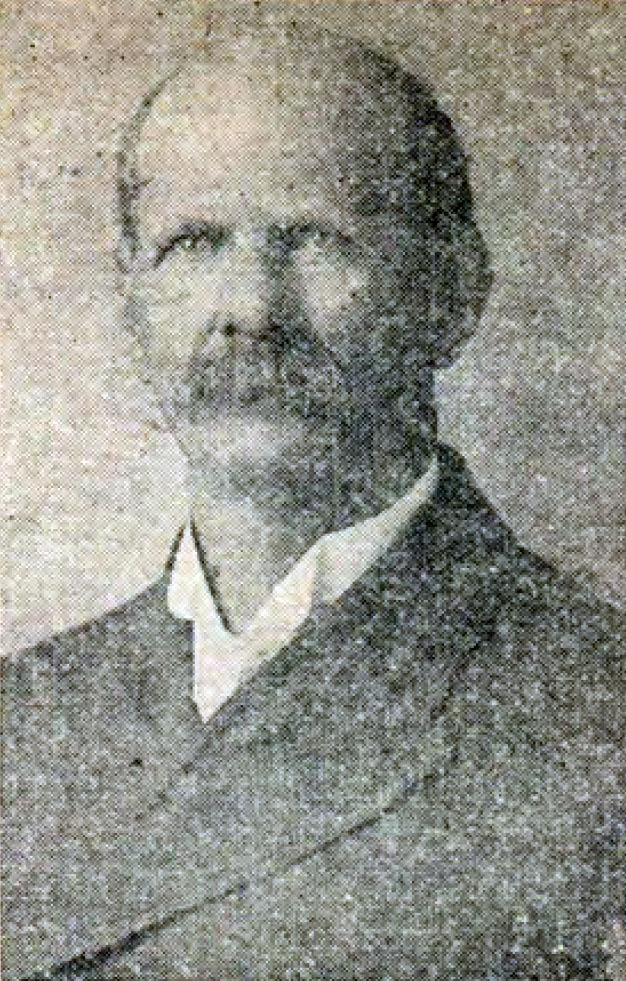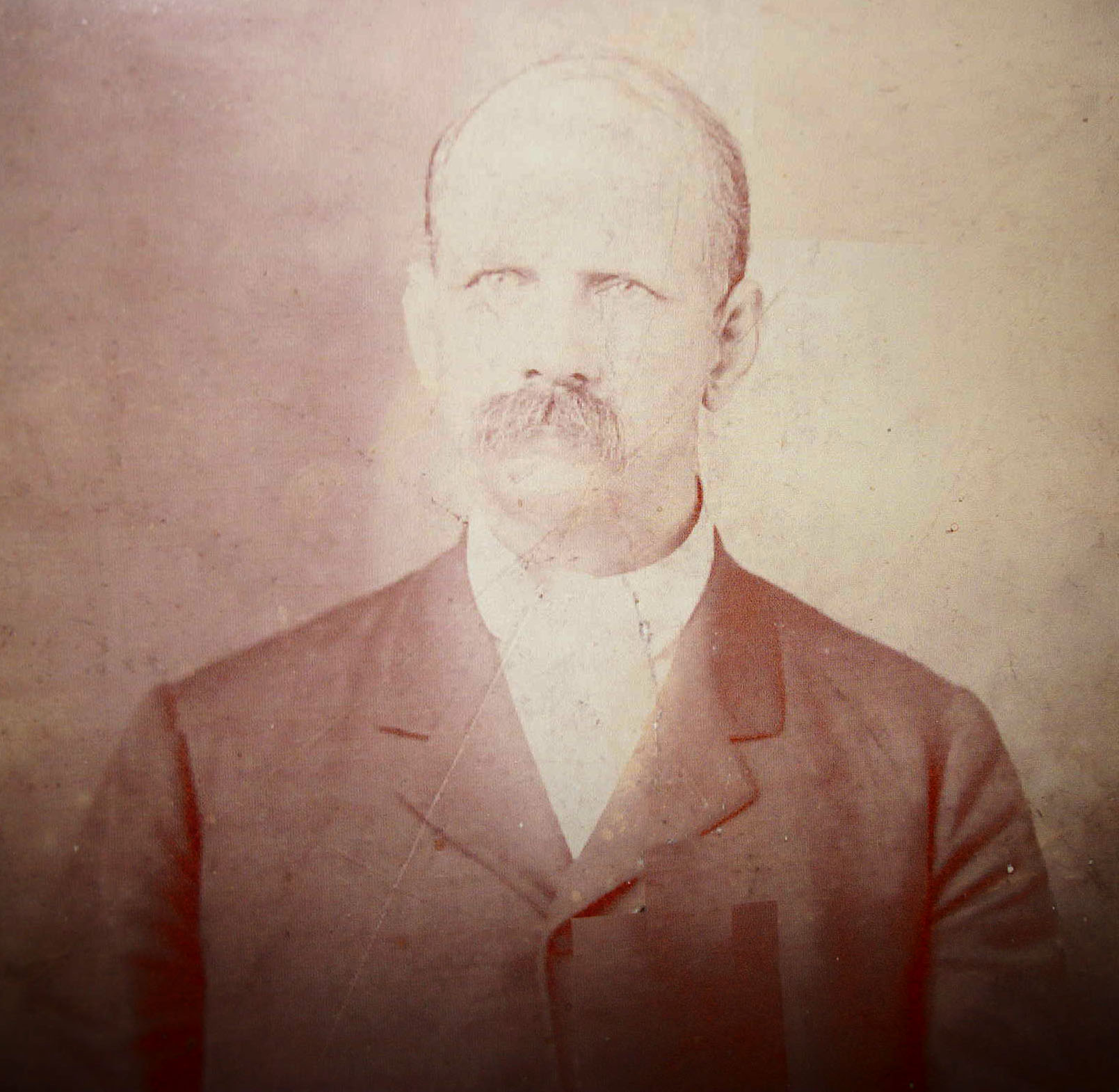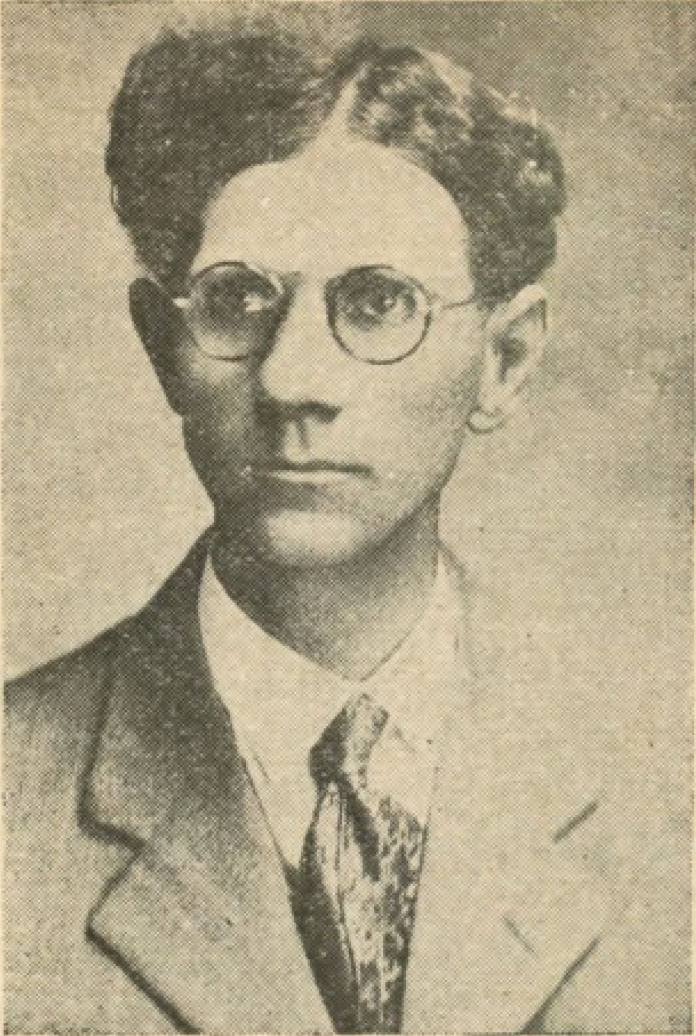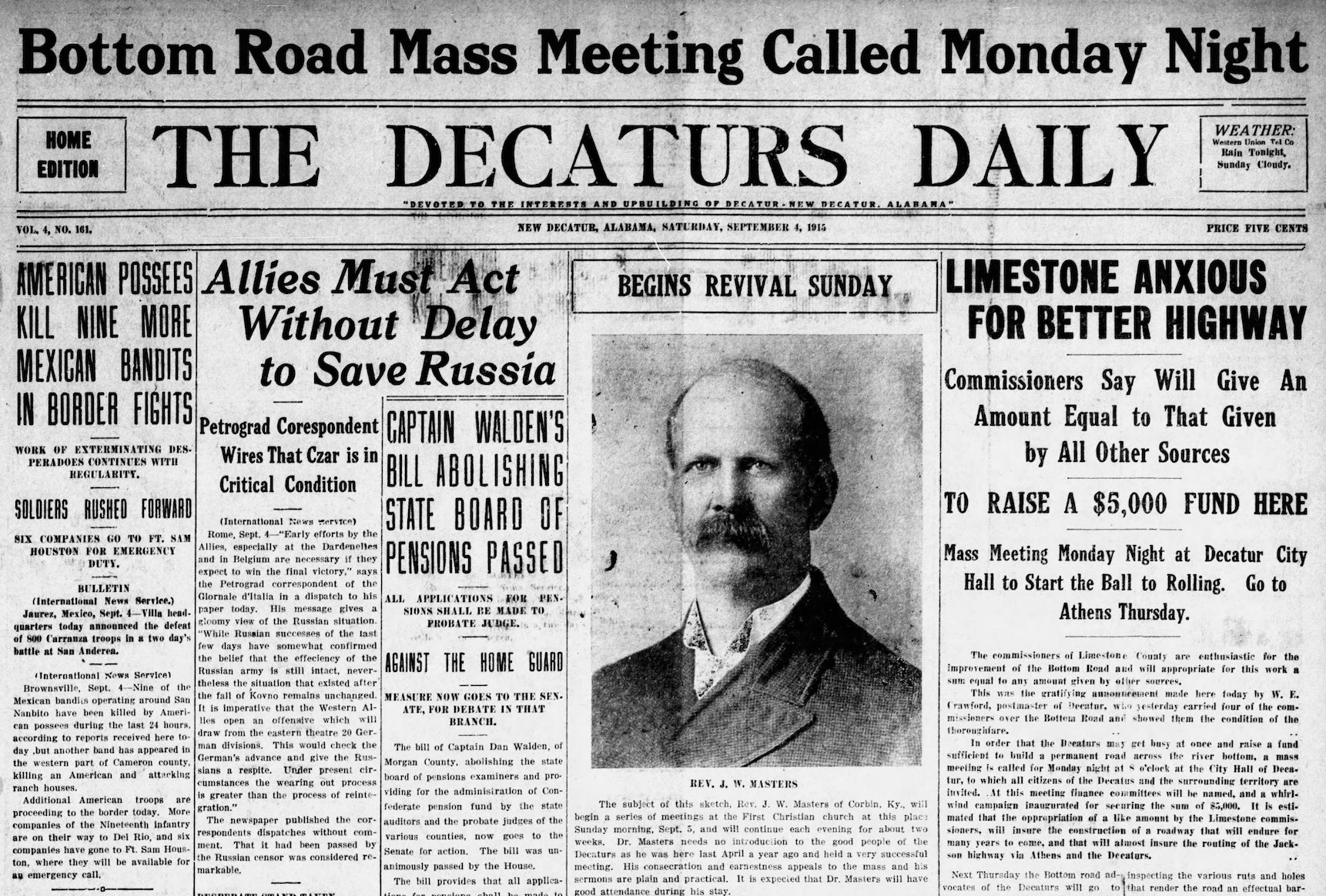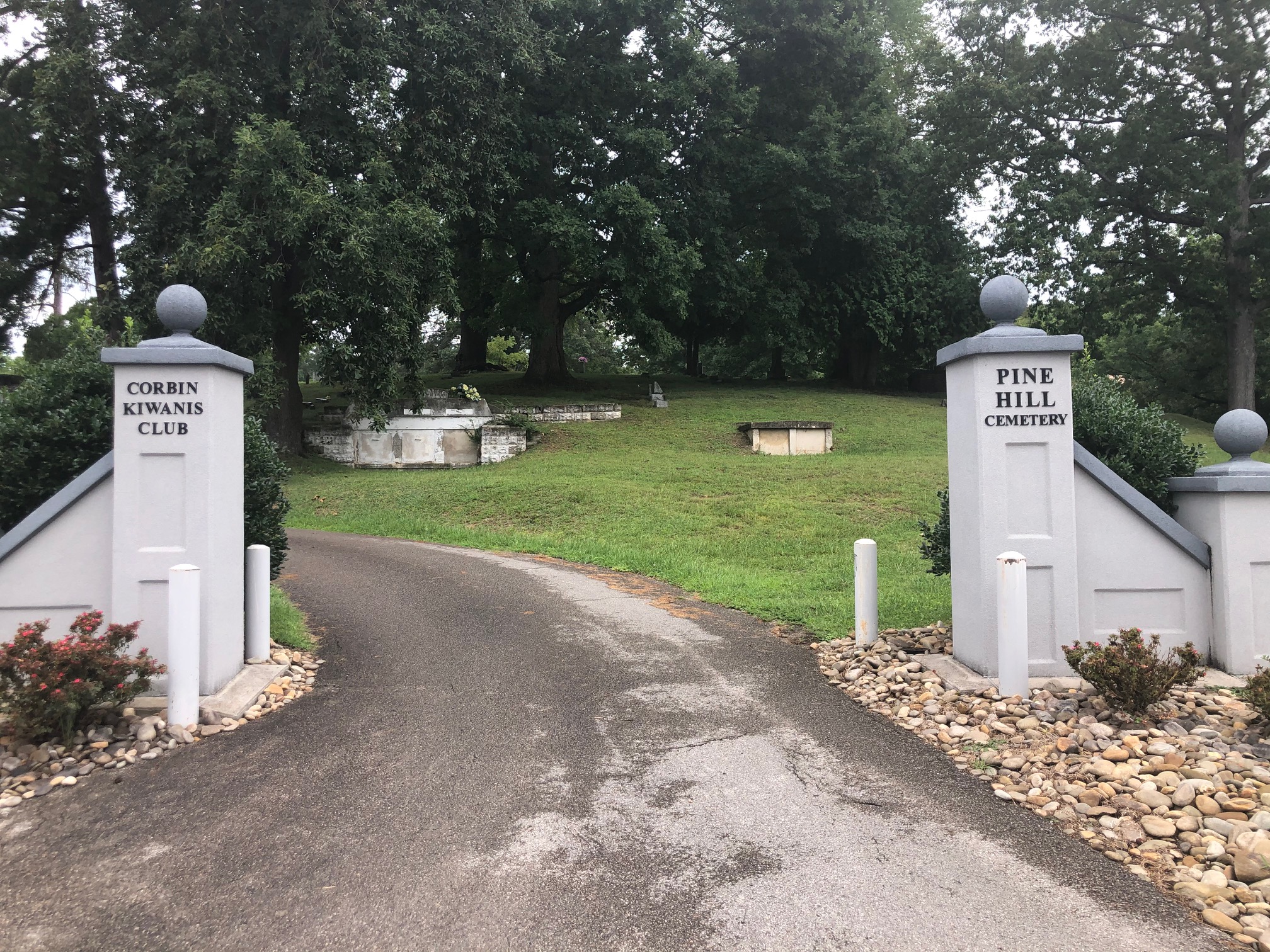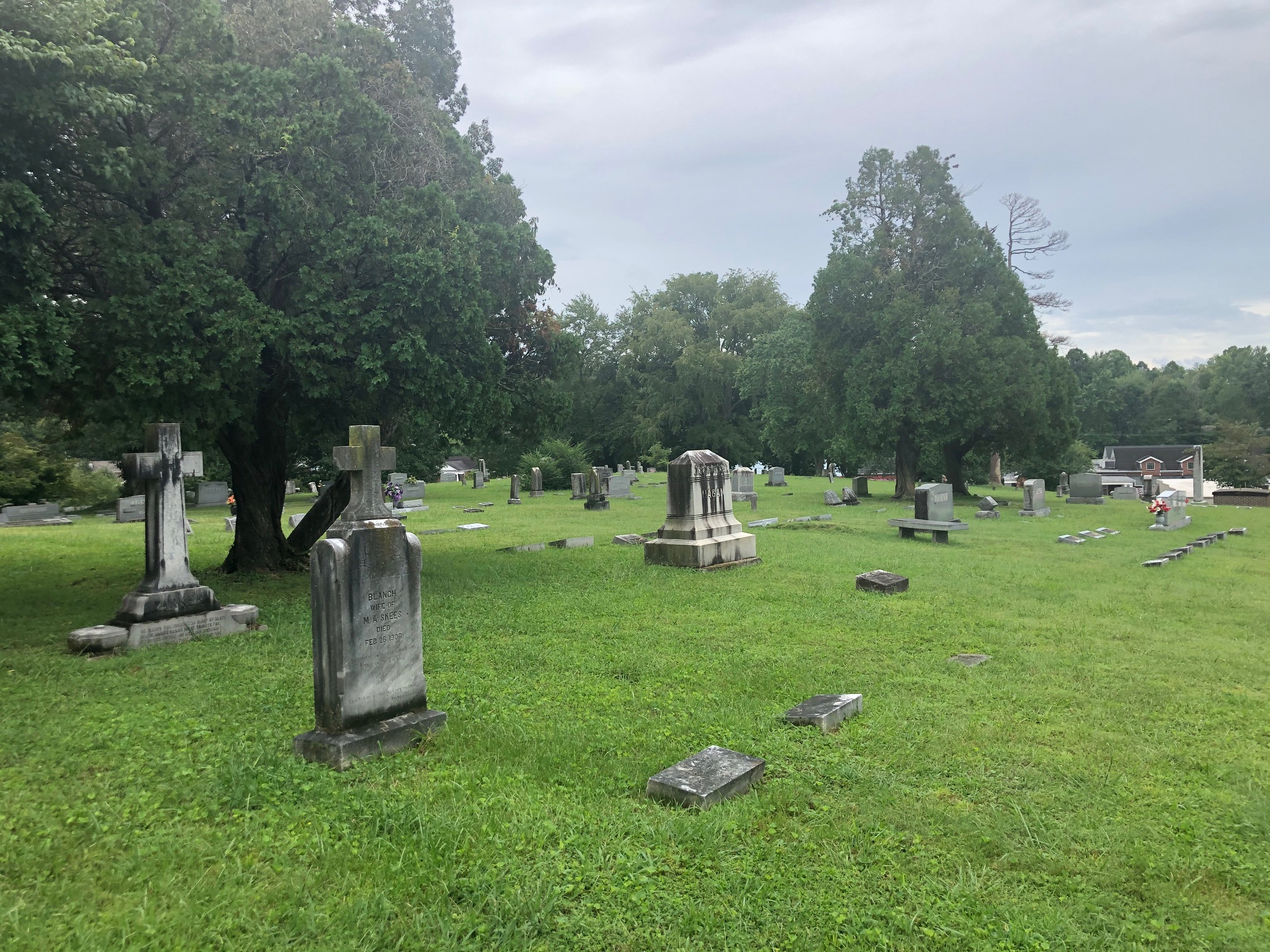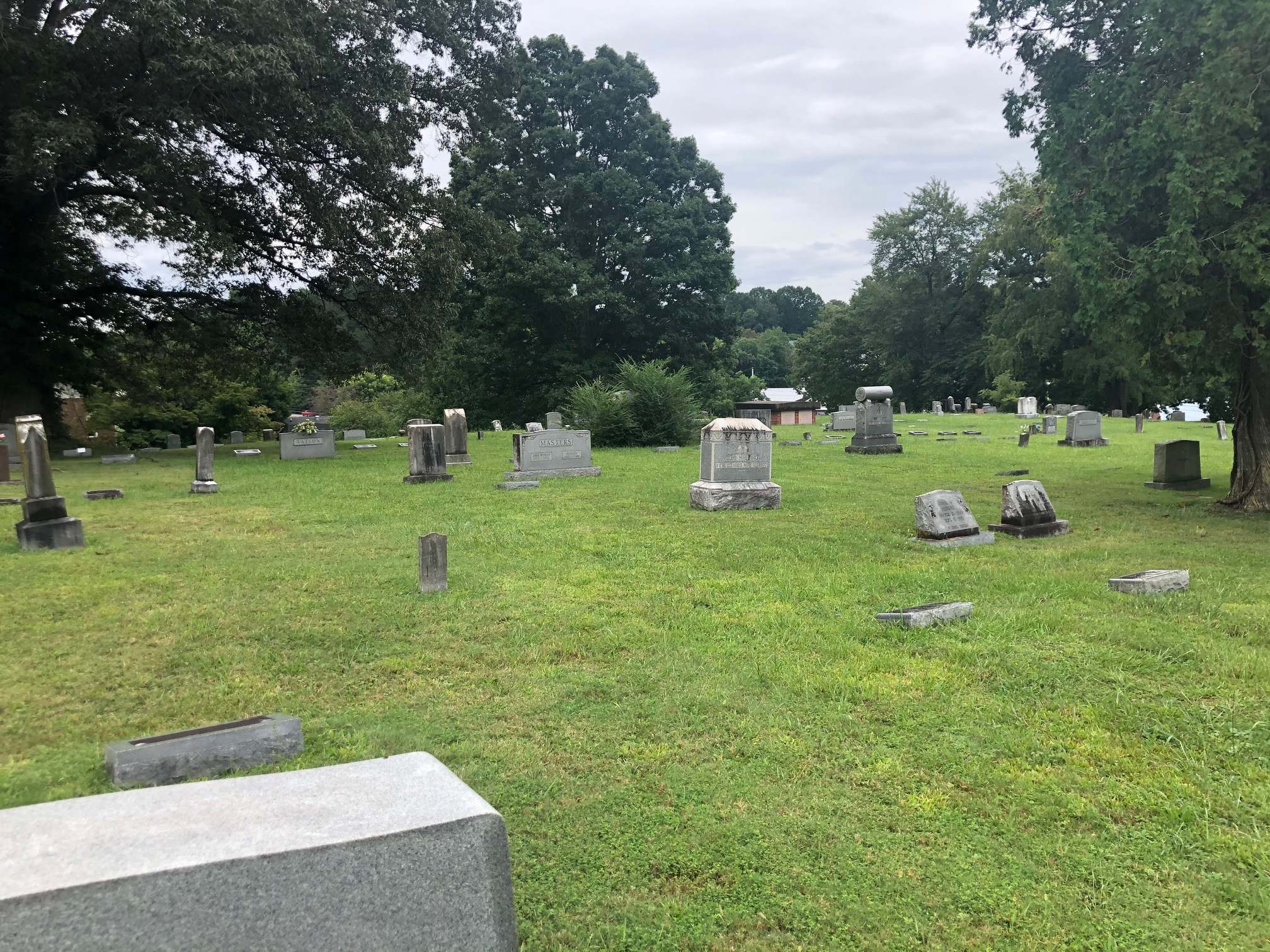John Wesley Masters
1854-1924
![]()
J. W. Masters
January 1, 1854—October 3, 1924
J. W. Masters was born in Scott County, Virginia, January 1, 1854 and fell dead is sight of his home at Lily, Kentucky, October 3, 1924.
On the outbreak of the Civil War, since his father (a Dunkard preacher and a Union sympathizer) had to choose between leaving Virginia and joining the Confederate Army, the family moved to Magoffin County, Kentucky, and remained there for ten years. When the subject of this sketch was ten years old, he had the desire to become a Dunkard preacher. He read his Bible to find out what it taught. One day, with his Bible in hand, he went his father and asked him to turn down a leaf where he could read about the Dunkard Church. His father replied, "It is not in the Bible."
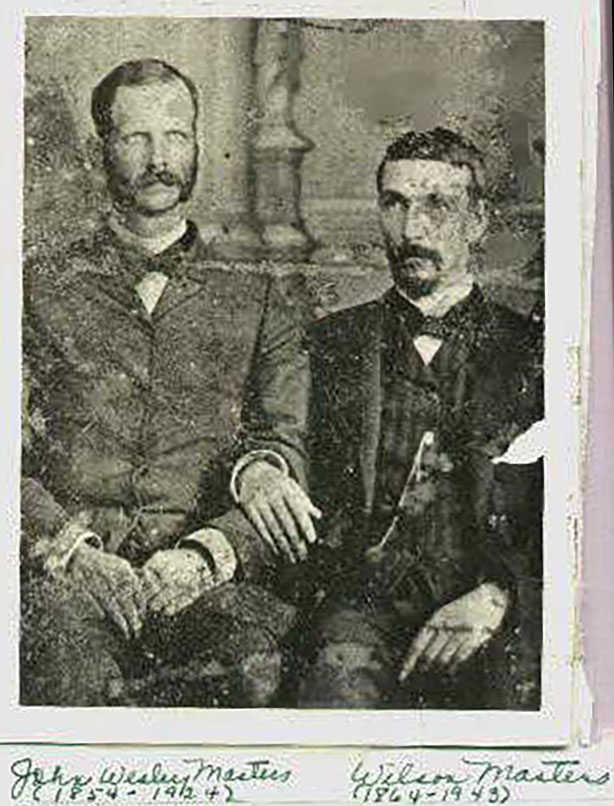
Source: Ancestry.com
When the thought occurred to him that his father belonged to a church which the Bible said nothing about, he told him frankly he would not join the Dunkard church. His father asked him if he were going to join the Baptist or the Methodist or the Presbyterian church. The son asked if they were in the Bible.
"No," his father answered, "none of the denominations are in the Bible."
The son said, "I have read of a church in the Bible; which one is it?"
The father replied, "Oh, that is the Church of Christ."
"That," said the son, "is the church for me." A little child shall lead them. The boy's question impressed his father and led him to think about denominations being unknown in the Bible which should be our guide in all matters of faith. Soon the father was satisfied to become a Christian only, a member of the body of Christ without additions or subtractions, and baptized his son.
In 1874 the family moved back to Virginia where the son attended school. Later he began teaching. On the last day of his school term he announced he would preach that night. From early boyhood he had been troubled with stammering. He accepted the suggestion that if he would place a bullet in his mouth, it would aid him in overcoming his stuttering. Consequently, before preaching, he put a bullet in his mouth and read Scripture from Ephesians 2:10. After speaking about a quarter of an hour and choking under embarrassment, he swallowed the bullet. He tried to cough it up, for it was the only bullet he had with him, but it would not come up.
In a few weeks he made a second appointment. To make sure this time of not swallowing the bullet, he cut a depression in the center, tied a string around it, and held the string between his teeth, but the bullet dropped out and dangled on his chin to his embarrassment, and amid the loud laughter of his audience.
Before his third effort, he went to the woods and preached to the trees and rocks and stuttered but little. This appointment was at Sloan's schoolhouse. After his sermon when he had dismissed the audience, a Baptist preacher began to reply to him. While Brother Masters was making his rejoinder, a Methodist man jumped up and said, "I will go to hell before I will be baptized."
He continued to preach, but after three years his brethren considered having a committee wait on him and ask him to quit preaching. On hearing of their purpose, he begged for a longer trial. Under the obstacle of stammering, he preached on, and when he baptized his three brothers and only sister, he received great encouragement to continue preaching.
In 1878 he married Rebecca Robinet. He states he travelled on horseback until he preached himself afoot. He explains that he preached until he had to sell his horses four times to pay store accounts.
An old brother invited him to come to his home to preach until he had baptized his children. After making the trip he preached ten days and nights and baptized the children in the home and several others. The old brother had told him he would "foot the bill." When he was preparing to leave, the old brother said, "l feel that I am due you a quarter, Brother Masters. I have nothing less than a half a dollar; if you will split her open, I will give you half of her." Of course, Brother Masters refused to "split her open." Ten days and many souls saved was his only reward here.
During a protracted meeting held by a Baptist, the preacher challenged the "Campbellites" for a debate. While Brother Masters repudiated this slurring nickname, as he repudiated all denominational names, he knew that the preacher had in mind those who stand for the restoration of the primitive order of the church in name, doctrine, and practice.
Brother Masters entered the place of worship and the preacher was singing, as he states, "like a lark," and was apparently in the best of health. Brother Masters approached him in the pulpit and introduced himself and informed him that he was there to accept his challenge. He then read a proposition which included the following: First, Baptist name; Second, Baptist vote on the fitness of candidates for membership; Third, closed communion; Fourth, mourner's bench system (Southern Baptists in the mountains used the mourner's bench at that time; Fifth, Final perseverance-can't fall from grace; Sixth, Repentance before faith.)
Brother Masters then said to him, "You show me these in the Bible and I will let you vote me into the Baptist church tonight."
The preacher replied, "I am sick, too sick to speak tonight."
Brother Masters said, "Show me one of them and I will take the balance."
The preacher again replied, "I am sick."
Brother Masters replied, "Get better by morning and we will try it."
Several Baptists near the pulpit overheard the conversation and doubted very much that their preacher was sick, judging from the way he had been singing when Brother Masters entered.
The next morning the people assembled, but their preacher did not appear. He was not sick, either, except as Brother Masters had made him mentally sick. Seeing he had shown that he was unwilling to face his challenger, one of his own brethren said, "I believe our pastor knows he is wrong, and I for one, bid him good-bye."
Another said, "I am with you."
A third man exclaimed, "The same dog bites me." Here is an example of mountain language and an example of honesty when convinced. Brother Masters organized a Church of Christ and secured a minister for these people.
The brethren had not been taught to give financial support to preachers, and Brother Masters, in his poverty, did not see how he could support his family and go on evangelizing. Dr. Silas Shelburne, of Lee County, Virginia, suggested that if he would move near him, he would help him study medicine in order that he might practice medicine for a living, and preach also. The requirements for practicing medicine in that day did not include attendance at a medical college.
Brother Masters accepted the offer, and Dr. Shelburne supplied him with text books and a skeleton. Soon our good brother was dissatisfied. He fell down on his knees and cried out, "Oh, God, my Father, sink or swim, live or die, I am going to preach." He placed the text books in one sack and the skeleton in another and carried them over to Dr. Shelburne. On seeing the Doctor, he said,
"Here, doctor, are your books and bones."
The Doctor said, "What do you mean?"
He replied, "I mean to preach."
The Doctor replied, "God bless you, go on, and as long as I have a dollar you shall not suffer."
A friend next invited him to preach in a union-house built of logs. As he approached the building with his saddle bags, an old man asked him if he was the one who came to preach. On receiving an affirmative reply, the old man said, "I sent you word not to come; did you get it?" Brother Masters told him he had received the message. Then the man said, "Well, what did you come for?" The preacher replied, "I came to preach."
"Then," said the objector, "you cannot preach in this house."
One old man sat clown on the ground and wept aloud, and cried out, "I helped to build this house; now the man I want to hear is not allowed to preach in it." Another man picked up two stones, one in each hand, and said, "He will preach here or I will whip a half dozen of you."
So the objector cooled off and said, "Go in and preach."
At the close of the sermon the same man who objected to Brother Masters preaching arose and said, "I am a Baptist, as you know, but I want to confess that this man has preached the truth, and I move that we all invite him to come back and preach again."
Denominational preachers were responsible for stirring the people against our people by false statements about what we taught. They turned good-meaning mountain people into a belligerent opposing group who had come to believe that our teaching was as dangerous as Mormonism, or even worse.
After Brother Masters had been away from home for a month, he returned and was informed that a "red hot" revival meeting was in progress. a union meeting conducted by a Baptist preacher from Kentucky and a Methodist preacher from Lee County, Virginia. The Baptist preacher at once sent Brother Masters word to attend and hear his sermon intended for him that night. When this man arose in the pulpit, he read his text from Acts 8:26. Then for more than an hour he "skinned and salted Campbellism." Finally exhausted by his efforts, he asked the old Methodist brother to conclude, but the old brother replied, "Enough has been said, such as it is."
The Baptist preacher then invited the people to return there at the regular hour the next day and adjourned the services. Then Brother Masters arose and asked for permission to speak, and the Baptist brother granted it. In a fine spirit he asked the Baptist preacher if he would give the same answer that the God-sent preacher gave over eighteen hundred years ago. The Baptist preacher arose and said, "This is my congregation and I will adjourn it; stand up and be dismissed."
Brother Masters said, "All who want to hear me sit down."
The Baptist preacher shouted, "Let's all go."
An old Methodist man who knew Brother Masters cried out, "You have got to hear Masters; you thought you were doing something great heckling on what you call Campbellites, and you think that Masters has no friends here because he has no brethren here. I want you to know that he has as many friends here as you have, and I am one of them." Then he added, "Now, I will tell you that I will tear every rag from your back before I will let you out."
Then other brethren exclaimed "Sit down," and the preacher knew enough about mountain people in such a situation to sit down.
Then the man at the door who had threatened to tear the clothing off the Baptist preacher said, "Brother Masters, get in that pulpit, and if you can't skin that preacher without skinning us Methodists, just skin us, for God knows that I am willing to be skinned just to see him skinned."
Brother Masters talked for about half an hour and said to the preacher, "If you are not satisfied with this, I will meet you here tomorrow."
The next day a crowd assembled, but the Baptist preacher did not return and thus ended the union meeting.
Brother Masters was finding it exceedingly difficult to support his family, and for a time he considered the study of law, and even sought out a friend, Judge Richmond, and discussed the matter with him, but again, his desire to preach prevailed, and he gave up the idea. He was happy ever afterwards that he made this decision.
While Brother J. B. Jones was Secretary of the Kentucky State Board, Brother Masters had his salary supplemented and devoted part time to preaching in the church at Barbourville, Ky., and part time to evangelizing. From that clay on he received far more financial support for his family. He held three meetings in Barbourville with fine results.
He began a meeting at Pineville while the Methodist circuit-rider, who made his headquarters there, was away. When the circuit-rider returned he learned that several people had made the good confession. The circuit-rider then went from house to house begging people to stay away from the meeting, but such tactics only increase the interest and the crowd. This preacher was an Irishman, who, when he saw the crowds moving toward the services went also. After Brother Masters closed his sermon and the invitation was made, he told the man he might say whatever he pleased. The Methodist preacher arose and related a story of a frog getting into the food at the spring house and its being discovered by Father Atkins, an Irishman, who hesitated to eat from that dish. Another preacher saw the frog and said to Father Atkins, "Eat what is set before you, asking no questions for conscience sake." Father Atkins replied, "Pshaw! do you think I can eat a frog for conscience sake?" Then the circuit-rider leaped and jumped around and around and stated he could not accept the sermon for conscience sake. Finally, he sat down. Brother Masters knew the people expected him to reply. He arose, therefore, and began by quoting Acts 17:30, "The times of this ignorance God winked at." "And," said he, "I will just wink also and adjourn."
The Irishman cried out, "Do you call me a fool?"
Brother Masters replied, "You can take it just as it sounds to you."
Once when Masters was out in a snow storm, he saw a light shining from a window in the valley where the city of Middlesboro, Ky., now stands, and stopped and asked for lodging. The stranger took him in and a warm supper was soon prepared for him. After supper Brother Masters asked the husband if he were a Christian and received a negative answer. Then said Brother Masters, "You have some sweet children that need the example of a Christian father."
The man replied, "That is true."
Then the preacher asked him why he did not become a Christian, and he replied that there were so many denominations he did not know which one was right. Brother Masters confessed that such made it confusing, "But," he said, "Do you know that men and not God are responsible for the existence of the denominations?" and added, there were Christians before denominationalism was thought of; don't you know that?" The man answered, "Yes."
Then said our preacher, who believed in personal evangelism, "You turn your back on denominationalism and all its excess baggage and obey the Lord, and you will then be all that you need to be." Later this man did obey the gospel and became an officer in the Church of Christ.
Our evangelist had an appointment at the head of a creek to begin a meeting on Wednesday and to continue it over Sunday. After his arrival he was told that one of the Methodist brothers had gone to town to secure his preacher to begin a meeting at the same place on Thursday. When Brother Masters closed his services on Wednesday night and announced the services for the following night and the daily services until Sunday, the Methodist brother arose and said, "Our preacher will be here tomorrow night and will remain until Sunday." Brother Masters replied, "I can stand him as long as he can me, and I guess you will find that out."
The preacher came, but refused to speak on Thursday night. Saturday morning there was a large assembly and the Methodist preacher asked Brother Masters to allow him to speak first and Brother Masters was delighted to do so.
He began with his Bible in one hand and the Methodist discipline in the other and tried to prove that the Discipline was a necessity along with the Bible. After he concluded, Brother Masters arose and said, "Brother, your Discipline says we are justified by faith only, and your Bible says we are not justified by faith only; which do you want your people to believe—your Discipline or your Bible?"
The Methodist preacher replied, "I am going home." He left, and that night Brother Masters was locked out of the church. Sunday morning a man whom Brother Masters had helped, and whose life he had probably saved when he was intoxicated, took his forty-five out of his trunk and shot the lock off the door in order that the meeting could go on.
After baptizing many people in another meeting, Brother Masters was called upon to debate with what the Methodists called their "war horse." On the second day of the debate, at noon, the "war horse" quit. An old Methodist brother said that "if we had known that Masters was so able, we would have gotten a bigger gun. We have bigger guns." An old brother replied, "Your gun is all right, but your ammunition is no good."
Brother Masters saw a Baptist preacher talking to a stranger, and the Baptist minister being a friend of Brother Masters, approaching the two, he said to the Baptist preacher, "Who is this man?" His friend replied, "This is our new pastor," and introduced him. Brother Masters shook hands with the stranger and stepped back and said, "I have just done something that Paul never did in his life."
The new minister said with interest, "What was that?"
"Why," said he, "I shook hands with a Baptist preacher."
The preacher said, "Was not Paul one?"
Our evangelist replied, "If he was, he never let anyone know it."
Brother Masters held a meeting where the Baptists had a congregation and a settled minister, and where we had but few members. The Baptist preacher heard all his sermons. On Sunday morning, Brother Masters preached on Christian Union, and just before he called for the invitation song, he said, "You Baptist people are invited to unite with us on the Bible alone. If you accept the invitation, let your preacher make the same proposition to us, and we will accept it. This means when we start to you we leave behind everything that is not in the Bible, and when we get to you everything that you can't show in the Bible, you throw out the window."
When the invitation hymn was sung, the Baptist preacher led the way and the flock followed. A Church of Christ was organized that very night, and the preacher who led the way became the minister of the united congregation.
While Brother Masters was the minister in Glasgow, Ky., he was called on one day to go about forty miles to hold a meeting. On his arrival, he was told that the people expected no additions, but just wanted the church warmed up. About one-half of the audience was made up of Methodists and Presbyterians. After he had been preaching for a week Brother Masters announced that he would discuss the next day the subject, "Why we do not sprinkle and pour water for baptism." The next morning two elders of the church waited upon him and advised him that they had decided that it was unwise to preach on that subject. He answered, "All right, help me get my horse and buggy. "
"What do you mean?" they asked.
"I am going home," he said.
Then one of them said, "Why we want this meeting to go on for a week longer."
Our evangelist then asked them what was the matter. They told him a Methodist brother had said he had not seen such interest in a meeting for many years, but if the preacher discussed sprinkling and pouring, it would bury the meeting so deep it could never be resurrected. Our evangelist replied, "All right, let her go. If truth buries it, it ought to be buried."
That night the house and the church-yard were full. When he exposed the substitute begotten in Rome for what our Lord commanded, and called for the invitation song, the two elders arose to lead the singing, using the same hymn book. As they sang Methodists and Presbyterians began coming forward. The elders were so excited they dropped the hymn book on the table and stopped singing. Brother Masters cried out, "Sing on, brethren, it looks like more will come." They grabbed at the song book and picked up the New Testament instead, but they sang on as people came forward, walking in the light and obeying their Lord in a Scriptural way. After the services the two elders begged his pardon and declared that they were ashamed of themselves.
His greatest meeting was at Corbin, Ky., where he had eighty-five additions to the church.
(The writer of this sketch loaned him a tent in which to hold a debate at Pennington Gap, Va., with Prof. Hurst, a Primitive Baptist, and I heard the debate. So able was he in establishing the time when the Church of Christ was established that Prof. Hurst endorsed his argument. After the debate Prof. Hurst said to Dr. Shelburne, "I acknowledge defeat." He has expected to identify himself with our people, but was accidentally killed a few days later.)
Once when Brother Masters had an appointment to preach at a school house, he was told that a Methodist preacher had threatened to meet him to answer the sermon. On his arrival he found the preacher seated on the rostrum and acting as if would preside at the meeting. The topic of the sermon was on the importance of being Christians only. Brother Masters turned to the Methodist preacher and asked the question, "Can a man be saved without being a Campbellite?"
The reply was "Yes."
Then he asked, "If a man can be saved without being a Campbellite, is there any use of his being one?"
The answer was "No."
Then Brother Masters asked him if a man could be saved without being a Methodist.
The preacher made no reply. Brother Masters pressed him to answer until he finally said "Yes."
Then said our evangelist, "All right, if a man can be saved without being a Methodist, is it necessary for him to be one?"
The preacher merely grunted. No one could hear except those nearest him. Our evangelist exclaimed, "Brother, belch it out so we can all hear." Finally, he said "No."
Our evangelist then said, "Brother, you have told the people it is not necessary to be a Methodist; you will surely never again be advising people to become Methodists."
Brother Masters then offered to give him an opportunity to speak, but he said, "I do not wish to say anything."
Wit, humor, and logical thinking made him a power to be reckoned with. With the truth on his side, a denominational preacher was left floundering in embarrassment when debating with him, or in any combat.
It is well to realize that he was not seeking debates, but ever ready to accept a challenge and to defend what he believed with his whole heart to be the truth. He preached the gospel in all its fullness, without fear or favor. He was not afraid he would offend someone by preaching the truth, but fearful he would displease his Lord if he failed to declare the whole counsel of God.
Brother W. H. Elliott, who was for thirty years Secretary of the Kentucky State Board, said that Brother Masters told him he had kept no record of the number of converts he had made. Brother Elliott had the records, however, of results while Brother Masters worked under the auspices of the State Board, and reports that 3,270 responded to Brother Master's preaching during this time. The record also shows that he helped at more than 200 places, organized 19 churches, and was paid $9,900 by the State Board for his services. Secretary Elliott adds, "Thousands of people in the hill country of Kentucky, Tennessee and Virginia knew him."
There were giants in those days when preachers believed the Bible and preached what they believed. They believed that denominationalism was founded on error; that it is a curse with its errors standing in the way of Christian unity and the salvation of the lost. The intolerant attitude of many denominational preachers in that day, their willful misrepresentation of our position, forced our preachers, especially those of the mountains, to defend that position with unusual fervor.
These pioneer preachers, like Brother Masters never faltered in convictions, but stood like a stone wall for the truth as it is revealed to them in the New Testament. Their children in the gospel were many.
-J.W. West (Author Note on p.32 - *I am indebted to J. W. Master's book, Following the Trail of a Preacher in the Mountains of Virginia and Kentucky for Forty-seven Years, for most of the facts in in this sketch, loaned by his son, S. H. Masters.)
-From Sketches From Our Mountain Preachers, by J.W. West, pages 32-47
![]()
S. H. Masters
son of J. W. Masters
![]()
Report Of Preaching At Crab Orchard
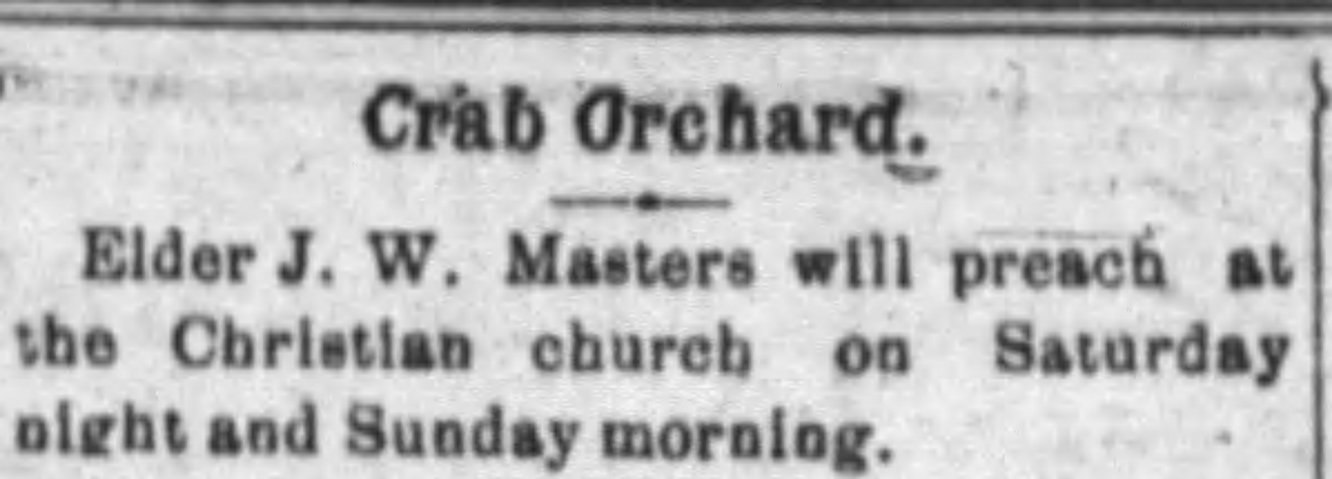
Semi-Weekly Interior Journal, Stanford, Kentucky
Tuesday, March 4, 1902, page 1
![]()
Newspaper Article On Dancing
by J.W. Masters

Mount Vernon Signal, Mount Vernon, Kentucky
Friday, March 13, 1908, page 5
(click article to read)
![]()
Alabama Meeting
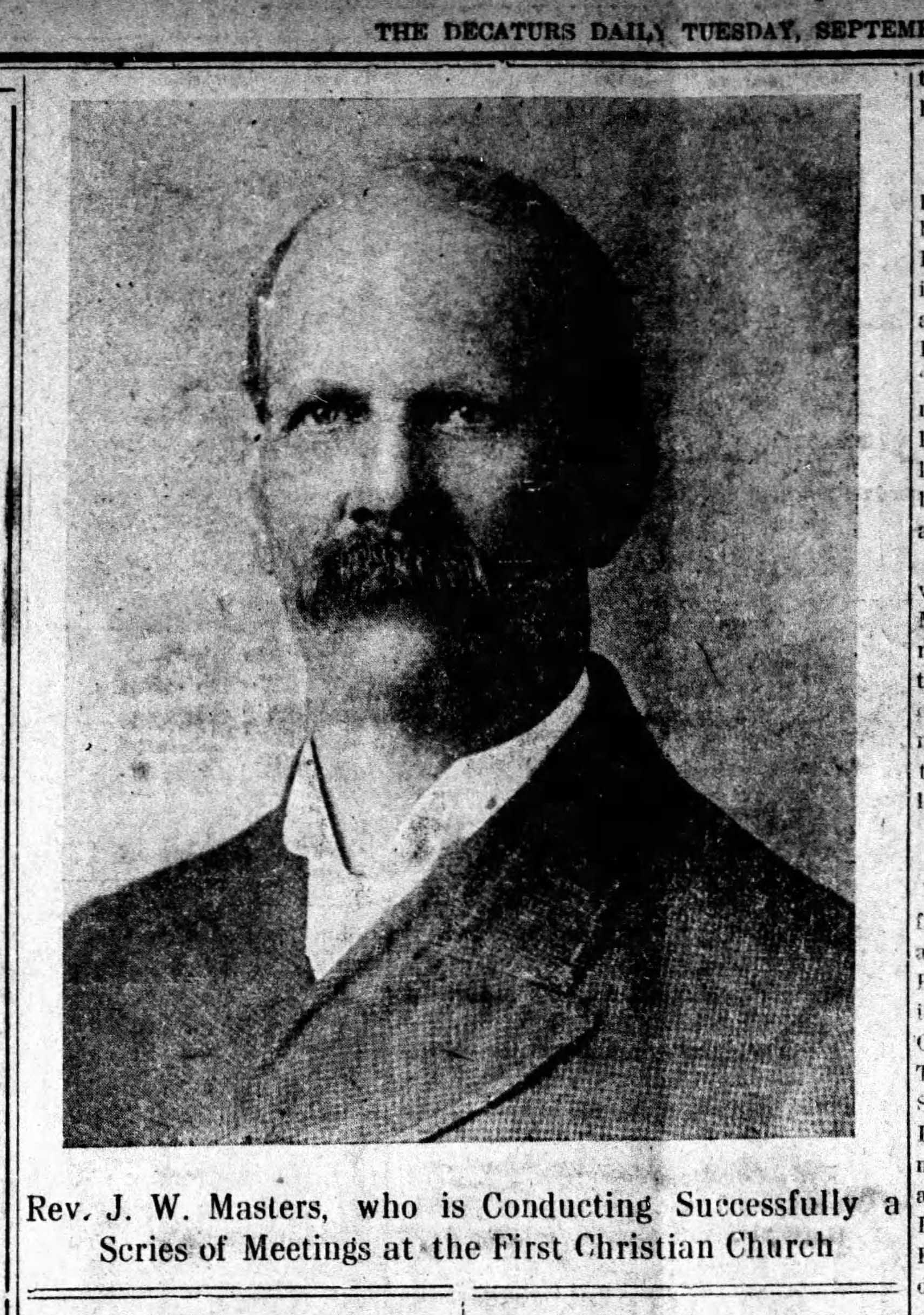
The Decatur Daily, Decatur, Alabama
September 14, 1915, page 6
![]()
Alabama Meeting
The Decatur Daily, Decatur, Alabama
September 4, 1915, page 1
(click article for a closer look)
![]()
Directions To Grave
The gravesite of J.W. Masters is in Pine Hill Cemetery off of Masters Street in Corbin, KY. After entering into the cemetery drive to the top of the hill and park in the first parking spot on the right. Then J. W. Masters is buried about 100 feet on your right.
GPS Location
36°57'17.9"N 84°05'00.1"W
or D.d. 36.954983,-84.083351
![]()
John Wesley Masters - 1854 - 1924
Rebecca Masters -
1852 - 1910
![]()
Grave Photos Taken by Barry Farris
Webpage produced 08.29.2020
Courtesy Of Scott Harp
www.TheRestorationMovement.com
Special Recognition: Many thanks to Barry Farris, pastor of Fariston Christian Church in London, Kentucky for sending photos of the grave of J.W. Masters in August 2020.
![]()
